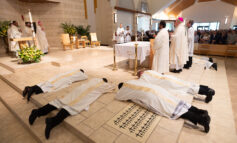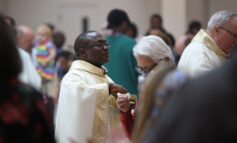
People sit on blankets and chairs as they listen to a homily by Father Jonathan Austin, pastor of St. Jude Chapel, during Our Celebration of Faith Mass at the Dallas Arboretum on June 15. (BEN TORRES/Special Contributor)
By Father Jacob Dankasa
Special to The Texas Catholic
In my ministry as a priest, I have the privilege and responsibility of reflecting on the scripture and sharing my thoughts with the people of God in the form of a homily or sermon. Scripture passages are windows through which we peek into our lives.
One beautiful passage that gives us a great deal of food for thought is John 8:1-11. In this passage Christ intervened on behalf of a woman caught in adultery.
When her accusers questioned Jesus, he challenged them, saying, “Let the one among you who is without sin be the first to throw a stone at her.” Jesus never endorsed her sins, but he helped her to know that she could begin life anew by not going back to them.
As a preacher, it would be easy for me to reflect on this passage by condemning the behaviors of the accusers and explaining how we shouldn’t be judgmental, and this is a very good interpretation of the passage — and a great sermon to preach. But looking at this passage deeply presents us with more messages for reflection beyond dwelling on the bad attitudes of the accusing men.
Reflecting more deeply on the characters involved, we can extract something very positive from the response of the accusers of the adulterous woman, even though conventional wisdom seems to suggest that the “losing characters” in a story (especially biblical stories) do not present us with examples of the virtues. In this story however, the losing characters present us with a lesson in humility.
It amazes me that when Christ challenged the accusers to cast the first stone if they had no sin, each of them, beginning with the eldest, dropped his stone and left. It takes humility to accept such a challenge, especially when it is presented in public. This may not look remarkable, considering their desire to condemn the woman, but I wonder how many of us today would accept a public challenge to own up to our own failures.
I reenacted the same scenario in my head, and I could imagine that if this were to happen in our present day, some accusers would still go ahead and cast their stones at the accused just to prove to the public how clean they are or to insist that the woman must die, regardless of whether they themselves are guilty of similar sins.
Everywhere in our world today — in politics, religion, our social lives, etc. — casting the first stone and blaming other people for the very wrongs we ourselves commit is a normal everyday occurrence. We show no mercy, even when another person’s offenses truly remind us of our own weaknesses. As ugly as the behavior of the accusers in Jesus’ story was, they can nevertheless teach us a lesson in humility — that accepting our imperfections is a doorway to helping others recover from their mistakes and learn to live again.
Mercy heals. Condemnation kills.
Father Jacob Dankasa is a parochial vicar at St. Anthony Catholic Church in Wylie.



